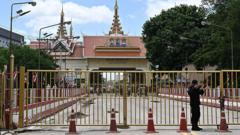In a significant political upheaval, Thailand's Prime Minister Paetongtarn Shinawatra has been suspended by the Constitutional Court, following backlash over a leaked phone conversation with former Cambodian leader Hun Sen. This development underscores the precarious state of her ruling coalition, already weakened by recent political shifts.
Thai Prime Minister Paetongtarn Shinawatra Suspended Amid Controversy

Thai Prime Minister Paetongtarn Shinawatra Suspended Amid Controversy
Thailand's Constitutional Court suspends PM Paetongtarn Shinawatra as she faces scrutiny due to leaked phone conversation.
In a shocking move, Thailand’s Constitutional Court has temporarily suspended Prime Minister Paetongtarn Shinawatra as it deliberates a petition seeking her dismissal, primarily fueled by a recently leaked audio of her phone conversation with former Cambodian Prime Minister Hun Sen. The widely circulated clip, in which she referred to Hun Sen as "uncle" and critiqued a Thai military commander, incited considerable public discontent and prompted conservative lawmakers to demand her resignation.
This decision could mark a pivotal moment for the Shinawatra dynasty, as Paetongtarn could become the third high-profile family member to be ousted from power preemptively in two decades. Her coalition government is hobbled by a slender majority following the recent departure of a crucial ally, exacerbating her political vulnerability.
The court's ruling, decided by a 7-2 vote, mandates Paetongtarn to present her defense within 15 days during which the deputy prime minister will fulfill the duties of the prime minister. Despite her suspension from the premier position, she will retain her new role as culture minister, acquired just hours before the court's verdict.
In her defense, Paetongtarn expressed her regret for any misunderstanding caused by her remarks, clarifying that herconversation with Hun Sen aimed at addressing long-standing border disputes and prioritizing national interests amidst rising tensions following a fatality involving Cambodian soldiers. She stated, “I had no intent to do it for my own interest... I only thought about avoiding chaos and loss of lives.”
Paetongtarn’s political future appears precarious; should she ultimately be dismissed, she would follow in the footsteps of Srettha Thavisin, her predecessor who was removed by the court last August, highlighting the judiciary's contentious capacity to disrupt Thai governance. Many critics argue that this trend speaks to a systemic issue within Thai political culture where the judiciary may be wielded as a tool against political adversaries.
At 38, Paetongtarn (the youngest prime minister in Thai history and only the second woman to hold this position) is grappling not only with the pressures of governing amid economic struggles but also a plummeting approval rating that has dwindled from 30.9% to just 9.2% over recent months. Adding to her challenges, her father, Thaksin Shinawatra, faces his own legal battles concerning charges of insulting the monarchy—issues that further entangle the politically influential Shinawatra family in the turbulence of Thai politics.
This escalation of legal and political drama highlights the ongoing uncertainties within Thailand’s governance, where the intersection of judicial power and political maneuvering continues to shape the nation's landscape.




















